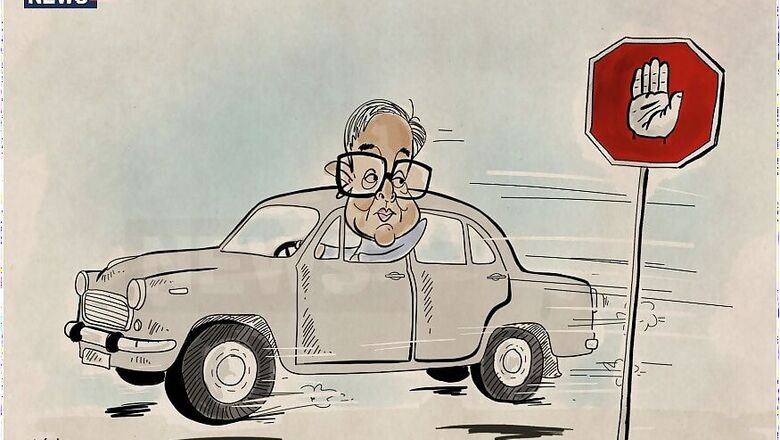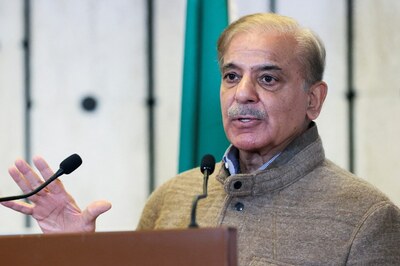
views
Nagpur is relatively pleasant at 36 degree Celsius, but Pranab Mukherjee is facing the heat, from family, friends and former colleagues. The erstwhile President, an old school gentleman, has maintained a dignified silence through the kerfuffle over his speech at the RSS Tritiya Varsh Varg later this evening - even when the censorious chuntering of a section of Congress leaders was endorsed by his daughter, an officer-bearer of the party's Delhi wing, who was prevailed upon to reprove her baba for having accepted the RSS invite.
The Congress babalog, however, could learn a thing or two about democratic principles, liberalism and pragmatism from the sagacious Pranab-babu. In politics, as in business, no one is an untouchable, regardless of ideology. To treat the RSS as taboo is just plain silly and an affront to realpolitik. Nor does it gel with the democratic mores to which the Congress claims to subscribe.
Mukherjee comes from a generation of politicians who understood the importance of having a conversation. The moment you stop talking, you've lost the plot. Jawaharlal Nehru in the 1960s, Indira Gandhi in the 1970s and Rajiv Gandhi in the 1980s were pragmatic enough to engage with former sarsanghchalak Balasaheb Deoras when circumstances required. The rigid stance of the Congress vis-a-vis the RSS is a post-Mandir and post-Mandal phenomenon. The intense competition for minority votes with the socialists and their offshoots from the late 1980s onwards pushed the Congress to a hard-Left stance.
If Mukherjee harboured any political biases when he was sworn in as President of India, he kept them firmly at bay. He was a scrupulously fair and apolitical President, hob-nobbing with senior RSS functionaries and maintaining a pleasant relationship with sarsanghchalak Mohan Rao Bhagwat. As always, he demonstrated respect for the Constitutional office he held and the ideological neutrality it demanded.
He no longer belongs to a political party, nor is he a flagbearer for any ideology. The grand old party would do well to accept that fact. Right-thinking members of the Congress, who know Mukherjee well, are worried neither by the contents of his speech nor by the fact of his presence at Nagpur.
As a Union minister, his doors were open to all (except those who taxed his limited patience), including right-wing sympathisers and affiliates. Nor did he need to perform a shudhikaran by raging against the “communal” BJP after a brush with the right.
He was immensely secure in his professionalism and had no need to prove his secular credentials at every opportunity. When right-wing groups met him on the issue of dams on the upper reaches of the Ganga, he gave them a sympathetic hearing and wrote on file: “The holy Ganga is the very foundation and is at the very core of our civilization. Our government is very conscious of the faith that crores of our countrymen and women have in this most holy of rivers”.
None of Mukherjee's ex-colleagues honestly believe that Mukherjee's acceptance of an invitation is in any way an endorsement of the RSS ideology. His daughter was clearly unnerved by fallacious rumours that she would join the BJP. She has been in politics long enough to understand the provenance of those rumours and dismiss them with the contempt, rather than criticize her father.
Mukherjee's erstwhile co-workers should remember his uncompromising loyalty to a party that hasn't always treated him well. He was evicted in the 1980s, but came back to serve it and become the mainstay of the UPA post-2004 - despite the fact that Sonia Gandhi chose the quasi-political Manmohan Singh over him as Prime Minister.
He was always available to advise and guide Sonia and Manmohan on tricky issues and navigated the Congress successfully through the crisis over the nuclear deal. A rare breed of politician capable of conquering ego, he publicly buried the hatchet with his Cabinet colleague, P Chidambaram, when their disagreement became an embarrassment for the party.
The wise and wily Mukherjee has accepted that the political right currently has a large footprint. Only through engagement with liberal elements within the right, can the extremist fringe be contained.
Instead of worrying about a former President graciously consenting to address a group of volunteers at the headquarters of an NGO, the Congress needs a new narrative, one that goes beyond the tired communalism-intolerance invective.
Certainly, the visuals of Pranab-babu addressing RSS volunteers will live forever, but as a testimony to his statesmanship.
The author is a senior journalist. Views expressed are personal.




















Comments
0 comment